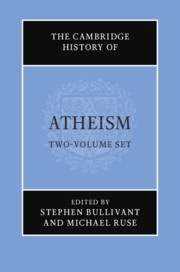Book contents
- The Cambridge History of Atheism
- The Cambridge History of Atheism
- Copyright page
- Dedication
- Contents
- Acknowledgments
- Contributors
- Introduction
- Part I Preliminaries
- Part II Atheisms in History
- Part III Reformation, Renaissance, Enlightenment
- 10 Reformation
- 11 Early Modern England
- 12 Spinoza and the Low Countries
- 13 Seventeenth- and Eighteenth-Century France
- 14 The Scientific Revolution
- 15 The Scottish Enlightenment
- 16 Al-Ghazālī
- 17 Lives of Jesus and Historico-critical Skepticism
- Part IV Classical Modernity: Philosophical and Scientific Currents
- Part V Classical Modernity: Social and Political Currents
- Part VI Twentieth and Twenty-First Centuries: Intellectual and Artistic Currents
- Part VII Lived Atheism in the Twentieth- and Twenty-First Centuries: Case-Studies
- Part VIII Emerging Atheisms in the Twenty-First Century
- Part IX Conclusion
- Index
- References
15 - The Scottish Enlightenment
from Part III - Reformation, Renaissance, Enlightenment
Published online by Cambridge University Press: 25 September 2021
- The Cambridge History of Atheism
- The Cambridge History of Atheism
- Copyright page
- Dedication
- Contents
- Acknowledgments
- Contributors
- Introduction
- Part I Preliminaries
- Part II Atheisms in History
- Part III Reformation, Renaissance, Enlightenment
- 10 Reformation
- 11 Early Modern England
- 12 Spinoza and the Low Countries
- 13 Seventeenth- and Eighteenth-Century France
- 14 The Scientific Revolution
- 15 The Scottish Enlightenment
- 16 Al-Ghazālī
- 17 Lives of Jesus and Historico-critical Skepticism
- Part IV Classical Modernity: Philosophical and Scientific Currents
- Part V Classical Modernity: Social and Political Currents
- Part VI Twentieth and Twenty-First Centuries: Intellectual and Artistic Currents
- Part VII Lived Atheism in the Twentieth- and Twenty-First Centuries: Case-Studies
- Part VIII Emerging Atheisms in the Twenty-First Century
- Part IX Conclusion
- Index
- References
Summary
The movement of thought and culture in Europe now known as the Enlightenment reached its peak in the eighteenth century. Having its roots in the humanism of the Renaissance and the Scientific Revolution of the seventeenth century, it embraced a confident and optimistic outlook on the prospects for human progress. Human reason, in the guise of scientific advance, could not only understand the world but also change it. Kepler and Newton in the seventeenth century had uncovered the elegant and simple principles that lay behind the cosmos. The puzzling trajectories of the planets against the background of the fixed stars proved impossible to account for on the old Ptolemaic astronomy without the introduction of ad hoc complexity. Planetary motion, however, became completely comprehensible once it was understood that they moved in elliptical orbits round our sun.
- Type
- Chapter
- Information
- The Cambridge History of Atheism , pp. 278 - 290Publisher: Cambridge University PressPrint publication year: 2021

